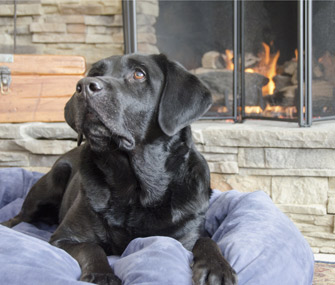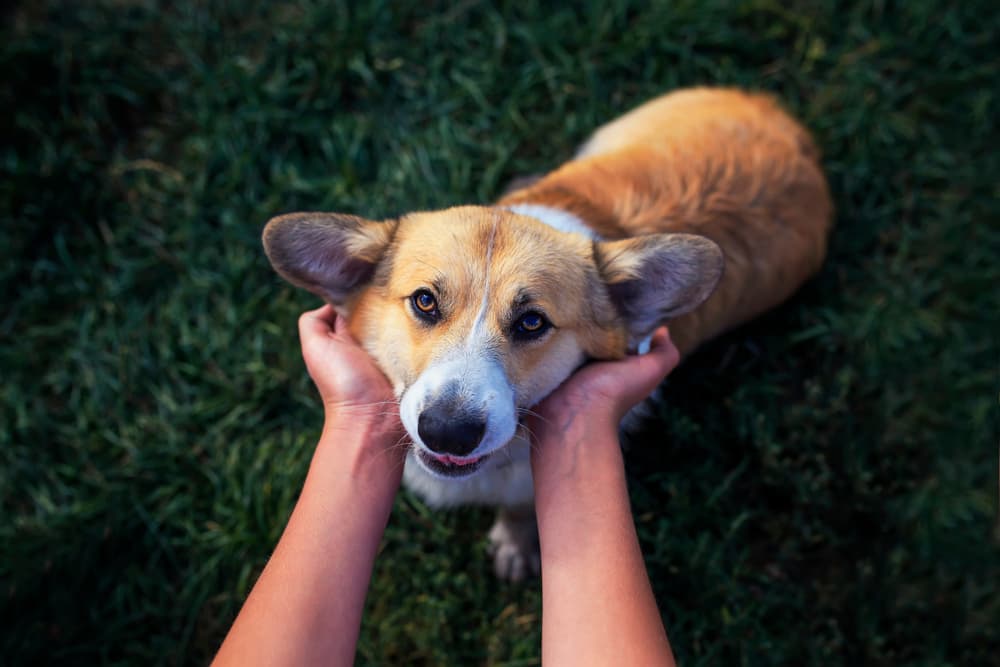Winter Hazards and Your Dog
Published on July 12, 2011
Skip To

- Winter can be hazardous for dogs, and it is important to be aware of the dangers to keep your pet healthy.
- There are indoor and outdoor winter threats to dogs, especially around the holiday season.
What You Need to Know
As the temperatures outside start to get lower and you prepare for colder weather, it is important to also prepare your dog for the winter. Whether your dog lives indoors or outdoors, there are dangers in colder conditions. Your dog’s health, food and environment all need to be taken into consideration when “Old Man Winter” approaches.Indoor Winter Hazards
During the winter, people and their pets tend to spend more time indoors, so it is important to keep the home environment safe for your dog. The following are some common issues to be aware of:Many types of houseplants can be poisonous to dogs. If eaten, these plants can cause problems such as vomiting and diarrhea, as well as other reactions that can be severe or even fatal. The American Society for the Prevention of Cruelty to Animals’ Poison Control Center provides a list of toxic houseplants, as well as dangerous outdoor plants, on its website. It is important to keep all dangerous plants out of your dog’s reach.
Burning candles, fireplaces, wood-burning stoves and space heaters create the potential for burns and smoke inhalation. The flickers and warmth of a fire can be an attraction for dogs; because of this, dogs should not be left alone in a room with open flames or hot electric elements. When these items are in use, monitor your dog at all times to keep him from getting burned or possibly starting a house fire.
Carbon monoxide poisoning can be a threat to dogs as well as people. Furnaces, gas water heaters, and gas/kerosene space heaters should always be evaluated for any leakage. Because dogs tend to be in the house for longer periods of time during the winter, they can be exposed to carbon monoxide leaks for longer, which may cause serious health issues or death. Checking smoke detectors (and purchasing smoke detectors that also detect increases in carbon monoxide) will help protect your pets and family.
Outdoor Winter Hazards
Being outdoors in the winter can be a lot of fun, but it is important to keep in mind that dogs are susceptible to frostbite, hypothermia (low body temperature) and other cold-weather hazards. Hypothermia can affect normal body functioning and produce injury or, eventually, death.Dogs that live outdoors in the winter need special attention to protect them from the wind, rain, and cold. Fresh, unfrozen water must be available to your dog at all times. If your dog has a dog house or igloo, make sure the interior is insulated. Safe heated mats, along with a good layer of straw, are an option that can help keep your dog warm and comfortable.
Dogs that live outside should be able to come inside when they want to. Old or sick dogs should be kept indoors whenever possible and monitored closely for signs of illness. Even a dog that is used to being outside can suffer hypothermia and frostbite. If severe winter storm warnings or extreme cold weather alerts recommending that humans stay indoors are issued in your area, it is a good idea to bring your dog indoors, too. If your dog cannot be brought into the house, a garage or mud room can provide enough shelter in some cases. But keep in mind that carbon monoxide poisoning can occur if dogs are left in cars with the motor running or in a garage with a running car.
The weather isn’t the only hazard your dog will face. Chemicals like ice melts and salts, antifreeze and windshield wiper fluids can all be toxic and can cause serious complications if dogs eat or drink them. Ice melts and salts can stick to the bottom of dogs’ paws, so it is best to wash your dog’s feet after he or she has been outdoors. Methanol and ethylene glycol, the toxic ingredients in windshield wiper fluid and antifreeze, can cause permanent kidney damage and even death if ingested by a dog.
Finally, going for walks in the winter can be invigorating, but it is best to keep dogs away from frozen water. Dogs can fall through thin ice into freezing water and may suffer hypothermia or drown.
Holiday Season Hazards
We all look forward to the winter holiday season each year, so it is particularly tragic when a family pet is harmed during this time. It is important to pay special attention to safety as you celebrate.Christmas trees can be very attractive to dogs. Dogs may eat the needles (even from artificial trees) or drink the water at the base of the tree, which can be toxic (especially if it has any sort of preservatives in it).
Electrical wires can be a serious hazard. Dogs that chew on these wires can sustain severe burns to the mouth, injury to the brain and lungs, or death from electrocution. It is best to keep wires out of reach or taped down securely. Also, lights may become hot and are best used only on the upper branches of trees, away from curious canines.
Ornaments are beautiful for people to look at, but dogs may think they’re toys. Fragile, breakable or edible ornaments may be knocked over, and wire hooks can get caught in your dog’s hair, skin, or—if eaten—stomach and intestines. An alternative to wire hooks is to use loops of yarn, ribbon, or lightweight twine. Hang the ornaments out of reach of your dog.
Tinsel can block the intestines if swallowed, requiring emergency surgery. Tinsel also has sharp edges that can cause cuts in the mouth. Angel hair, which is made of spun glass, is also irritating if touched.
Gifts should be checked for small, breakable parts that can be easily swallowed. As with tinsel, string and ribbon can cause intestinal injury or blockage. Monitoring your dog around these items is highly recommended.
Human holiday foods, like chocolate, coffee, macadamia nuts, yeast dough, and alcohol, can all be hazardous to dogs. For example, theobromine, an ingredient in chocolate, can cause seizures and death if eaten by dogs. Caffeine (in coffee and chocolate) can also cause seizures, along with diarrhea, abnormal heart rate/rhythm and death.
We all want our pets to enjoy the winter holidays with us. By taking a few precautions and preventive measures, dogs can be protected from many common winter hazards.


